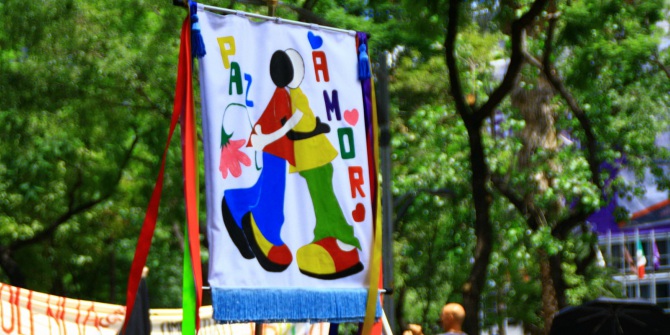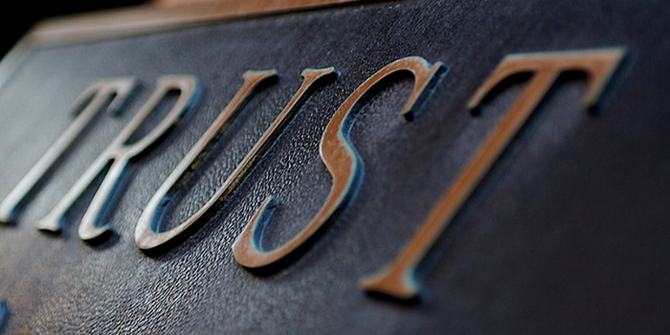 Liberal democracies are struggling from within, but also from without, writes John Owen. In his new book, The Ecology of Nations: American Democracy in a Fragile World Order, he argues that the international environment is no longer selecting for democracy. The solidification of authoritarian great powers such as Russia and China, in combination with the failure of ‘open liberalism’ has put considerable pressure on Western democracies. The solution may be for democracies to move to a more ‘pluralistic liberalism’, which values commitment, communities, and people, and to recognise that disagreements with autocratic countries about the world order are here to stay.
Liberal democracies are struggling from within, but also from without, writes John Owen. In his new book, The Ecology of Nations: American Democracy in a Fragile World Order, he argues that the international environment is no longer selecting for democracy. The solidification of authoritarian great powers such as Russia and China, in combination with the failure of ‘open liberalism’ has put considerable pressure on Western democracies. The solution may be for democracies to move to a more ‘pluralistic liberalism’, which values commitment, communities, and people, and to recognise that disagreements with autocratic countries about the world order are here to stay.
Scores of books and countless articles have been published about the ongoing troubles of democracy in America. Most authors look, reasonably enough, within the United States for the sources of trouble. Bad policies and autocratic politicians; demographic changes and an out-of-touch elite; media echo chambers and polarization; white evangelicalism and ‘wokeism’: all of these are in the dock.
But Americans often forget that many other wealthy liberal democracies are going through similar travails, although in less extreme form. They also forget that the democratic world has been here before. During the 1930s fascist states multiplied in Europe, the Americas, and East Asia and, along with the communist Soviet Union, appeared better equipped than democracies to pull countries out of the Great Depression. Constitutional self-government was in genuine danger in that nightmare of a decade.
The difficulty of liberal democracy
My new book, The Ecology of Nations: American Democracy in a Fragile World Order begins with the premise that today, as in the 1930s, things are happening in the international environment that make it hard to be a liberal democracy. I use the word ‘environment’ deliberately because countries are much like species of animals and plants in the natural world. Countries exist in a complex environment, which includes other countries, information, and rules and institutions. In evolutionary language, the environment can sometimes ‘select for’ and sometimes ‘select against’ democracies.
And just as in the natural world some species can shape the environment to favour themselves and their type – as long-toothed beavers do when they fell trees and build dams – the most powerful countries can and do bias the international ecosystem toward their own kind.
Since the Second World War America and its allies, including the United Kingdom, have been doing just that: ‘fixing’ evolution in favour of democracy. They have done this through a set of international institutions that make democracies more stable and secure, through (selective) democracy promotion, and through sheer economic and technological success that has enhanced the international reputation of democracy. For several decades the Soviet Union pushed back and tried to engineer the ecosystem in its own direction, but by the 1980s it had clearly failed. The Soviet effort at liberal reforms and ultimate collapse show just how effective was US ecosystem engineering.
Now, well into the twenty-first century, why is the international environment no longer selecting for democracy? There are two large and difficult problems.
Authoritarian great powers
First is the problem of authoritarian great powers. In the 1990s, when the environment made it easy to be a democracy, it appeared that both China and Russia were firmly on the road to liberal multiparty government. Communism had failed and dozens of authoritarian states were democratizing. Why should these two be any different? In subsequent years, however, Russia and China have deviated sharply from the script. Both have become more autocratic in recent years and have remained remarkably stable as they did so.
And the Xi and Putin regimes in China and Russia, respectively, both believe that being authoritarian is in their national interest – that if their countries became liberal democracies, they would become weak and even fall apart. No surprise, then, that both are using their new leverage, separately and together, to try to remove the liberal bias from the international ecosystem. Each wants to keep in place some features of the order, such as openness to foreign trade and investment. But they both believe, with reason, that international institutions and rules concerning human rights, the internet, and even trade and investment are biased against authoritarian regimes.

“Vigil4Democracy_SF_IMG_4998-1” (CC BY-NC 2.0) by rawEarth
On human rights, Beijing and Moscow have worked to make the UN’s assessment procedures less open. They also aim to alter global discourse so that the right to national independence and economic development are placed above individual rights to free speech, religion, and so forth. On the internet, they have laboured to replace the norm of complete openness, originating in Silicon Valley, with one emphasising national sovereignty (that is, censorship). On trade, they have resisted agreements such as the Trans-Pacific Partnership that would uphold labour rights and safeguard the natural environment.
Through its immense foreign infrastructure Belt and Road Initiative investment project, China has also exported sophisticated surveillance and recording technology that makes it easier for autocrats to monitor their citizens. China also has rejected transparency in most of agreements that finance these projects, instead doing business through its own state-owned banks.
Problems with democracies themselves
But the blame for democracy’s difficulties cannot all fall on the authoritarian giants. The second reason why the international environment is making it hard to be democratic comes out of the democracies themselves, especially the United States. For decades, America has been infusing the international order with a new kind of liberalism, open liberalism. Many Westerners are quite attached to open liberalism, and it has achieved many good things. But today, overall, it is reducing the appeal of democracy. To see this, we need to understand how liberalism itself has changed over the decades.
Liberalism is a philosophy that regards individual freedom as the highest political good. But what is meant by freedom, and how it is safeguarded, has varied a great deal over the centuries. For the classical liberals of the eighteenth-century Enlightenment, the chief barrier to liberty was the despotic state, the old alliance of throne and altar. The remedy, for classical liberals, was the small state that largely left individuals (at the time, adult white men) alone to pursue their happiness.
In the early-to-mid-twentieth century, classical liberalism proved unable to handle the challenges posed by the industrial revolution, especially the urban working class and the boom-bust cycles of capitalism. During the Great Depression of the 1930s, the idea took hold that the greatest threat to individual freedom was no longer the state but unfettered capital – corporations, banks, and the unregulated market. The result was a second stage of liberalism, welfare liberalism, under which the state actively regulated markets and redistributed wealth.
It was under welfare liberalism that the United States, Great Britain, and other democracies built the liberal international order to ensure full employment, low inflation, and steady growth. But in the 1970s it became evident that welfare liberalism had also run its course. Inflation and unemployment had become chronically high, and the conformist culture of welfare liberalism alienated millions of young people.
Moving from open to pluralistic liberalism
Thus came open liberalism, a fusion of ‘neoliberalism’, or the deregulation of markets, and ‘social liberalism’, the embrace of experimentation and fluidity coming out of the counterculture of the 1960s. Open liberals regard the chief barrier to individual liberty not as the state or the market, but traditional norms, customs, and boundaries.
By the late 1980s open liberalism had replaced welfare liberalism as the ordering principle of the international environment. It has to its credit the end of the Cold War and the uplift of hundreds of millions out of poverty in China, India, and other countries. But it has alienated millions of residents of wealthy democracies by shrivelling manufacturing and mining and by devaluing the culture of small towns and rural areas. It has created wide and deep discontent, politically polarising populations and opening the way to populist movements and politicians whose commitment to liberal democracy is dubious at best.
What is to be done to relieve this ecological pressure on democracies? Doubling down on open liberalism would not work, because open liberalism is what has brought on the crisis. Returning to pure welfare liberalism or classical liberalism is not possible either; there is a reason why each was retired long ago. The Ecology of Nations introduces the possibility of a fourth stage of liberalism, pluralistic liberalism, which would be friendlier toward people and communities that value commitment over novelty and disruption. The book also considers whether it really is possible for democratic and authoritarian great powers to agree on the shape of international order. As long as China and Russia remain committed to authoritarianism and the West to liberal democracy, the world might settle on having two separate but overlapping orders – one that favours democracies, the other partial to autocracies. Such a world might not grow as fast economically, but it also might ease the survival and flourishing of constitutional self-government in the twenty-first century.
- Please read our comments policy before commenting.
- Note: This article gives the views of the author, and not the position of USAPP – American Politics and Policy, nor the London School of Economics.
- Shortened URL for this post: https://wp.me/p3I2YF-dDK






